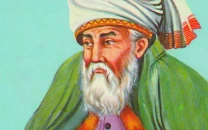The A, S and Q of Asrar's Malango
Ideas that malang singer Asrar sings in his songs are reminiscent of philosophy of great mystic Mansur Al-Hallaj

PHOTO: ASRAR FACEBOOK PAGE
Undoubtedly, ideas that today malang singer, Asrar, sings in his spirituality-studded songs are reminiscent of the philosophy of the great mystic and revolutionary Mansur. His new song titled Malango is a manifestation of this fact.
“I have always tried to discuss ideas in my songs that people hesitate to talk about; and my song Malango is about the condemned alcoholics and drug addicts we see in our day-to-day life,” he says, revealing the spiritual thought behind his music.
“I want the well-to-do of society to think 'what made these mawalis (mystics or junkies) adopt this lifestyle?'. I want people to read the faces, eyes of drug addicts and try to figure out their connection with God.”
I didn’t like the video of ‘Afghan Jalebi’: Asrar
Malango is a special feast for Asrar fans, in every single aspect of this song, there lies a meaning, beautiful and deep as the philosophy of Sufism itself.
The music video starts off with, "A malang named Asrar live centuries ago" and then immediately takes the viewer on a roller coaster ride with mind-boggling visuals and lyrics that many in our society would label as questionable.
“There are men wearing white dresses, with colorful beards and hair, holding out-of-the world musical instruments. I have tried to leave my listeners to think and question,” the singer says.
“The white dress may symbolise the shroud humans are wrapped in when they die, or perhaps it can represent semen, of which they are born.”
Asrar recounts that once he was travelling with a fellow mystic when an uneasy feeling took over him, making him question his existence and the journey of life.
“It was precisely that juncture which made me ponder over why we always have to go forward. And in this song, I have tried to travel backwards from where I belong and imbue some secrets. This is the reason we have used alien things in our video like the strange-looking guitar, the clothes, colored beards and hair.”
The most intriguing part of Asrar’s song comes when he presents a bowl of filled with wine to his listeners and sings, "Aen day naam da, sheen day naam, hareikqaaf day ghulamnaam da... Chuklopiyala jam da (Drink this bowl of wine, in the name of A, S and Q… drink it)."
Scores of his fans and followers may be scratching their heads contemplating what the singer meant in these lyrics.
“These three letters combine to make ishq (love), which is the most beautiful, amazing feeling in this life. But Aen, Sheen, Qaaf might also mean different to different people. A friend told me that he took the letter A as Ali, S as Shabbir, and Q as Qalandar, which could also be true.
"This is what my aim is; I put things there and let people think, question notions,” explains the singer.
In an Islamic society where carrying a bottle of alcohol may land you behind bars, Asrar openly talks about it in his song, even urges his listeners to devour the drink.
“People might take me wrong here as I implore in my song to drink the bowl of wine. But, the aware ones know what I mean by saying drink it in sips, gradually, and in episodes, and keep drinking it. Now tell me, is that possible for any human to keep drinking the wine? Will not it lead to his death? I am talking about a different form of wine, which has a divine feeling and can bring people closer to their god.”
On a number of occasions, fans ask the mystic singer to elaborate on his wonderful, mesmerizing and often questionable lyrics. He remembers one such instance when a Hindu believer approached him after a concert, hugged him and started sobbing.

“This brother asked with teary eyes, what I meant by Haidery Tillak in my song titled Ali Wali,” he recalls.
“These made me realize that people do think about my songs and search for the meanings.”
But his work doesn't always garner appreciation by his fans and followers. Asrar is often criticized for crossing the boundary and using secretive lyrics in his songs. The singer responded to the spite by posting on his social media page that he did not care about such censure, as he was in search of “friends not fans”.
[fbpost link="https://www.facebook.com/asrarmusic/photos/pb.264934330542.-2207520000.1457092123./10156491647875543/?type=3&theater"]
He shares that he is always driven by a divine force to write such meaningful lyrics and Malango is also a product of that phenomenon. “I have to convey to people what I am revealed to,” he says.
The Sufi singer says that he despises tags put on people, maintaining that it is despicable to label people as bhangi, sharabi or charsi. “My ancestors are Syeds but I own my people, I own kanjars, mirasi, charsi, the condemned junkies and alcoholics. I belong to them and my songs are for these condemned, social outcast segments of society,” he says with a heart filled with utter joy, and love for fellow human beings.



















COMMENTS
Comments are moderated and generally will be posted if they are on-topic and not abusive.
For more information, please see our Comments FAQ